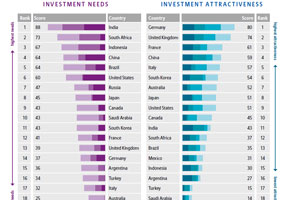At the Paris climate conference (COP21) in December 2015, 195 countries adopted the first-ever universal and legally-binding global climate deal. In doing so, they have made a serious commitment to combatting global warming. The long-term objective? To keep the increase in global average temperatures to well below 2°C above pre-industrial levels. If global warming crosses this important threshold, the effects could be catastrophic.
Meeting this ambitious goal will require a full decarbonization of the global economy by the end of the century: a particularly challenging feat for the energy sector, which is the largest source of carbon emissions. In failing to comply, existing and even new power plants would be at risk of going dark. That is unless they are operating on renewable energy or have found a feasible – and yet unknown – means to capture and store carbon.
The transition from carbon-based to low-carbon energy will be expensive and require tremendous investment. Yet surprisingly, none of the G20 countries, even policy frontrunners such as Germany and the United Kingdom, are currently taking sufficient steps to combat the rising investment gap.
To assess how G20 countries are doing in fulfilling their obligation, and to assess the needs and attractiveness of low-carbon investments, Allianz Climate Solutions together with the NewClimate Institute and the non-governmental organization Germanwatch developed the “Allianz Climate & Energy Monitor”. The Monitor ranks all G20 member states on their relative attractiveness for investment in a low-carbon-energy infrastructure, taking into account current and future investment needs in the sector in line with a 2°C global-warming trajectory.
The Monitor reveals some telling surprises. For instance, who would expect China to rank among the top five, making it more attractive for investments than the United States? Or that Turkey and Saudi Arabia are currently the least attractive countries during this low-carbon energy transition.
In a previous version the report contained rounding errors in Table 1. These have been corrected on June 3 2016.
Two degrees of green
Downloads

Overview of results of the 2016 Allianz Climate and Energy Monitor.Click here for the full graphic
Further information
Forward Looking Statement disclaimer
As with all content published on this site, these statements are subject to our Forward Looking Statement disclaimer: